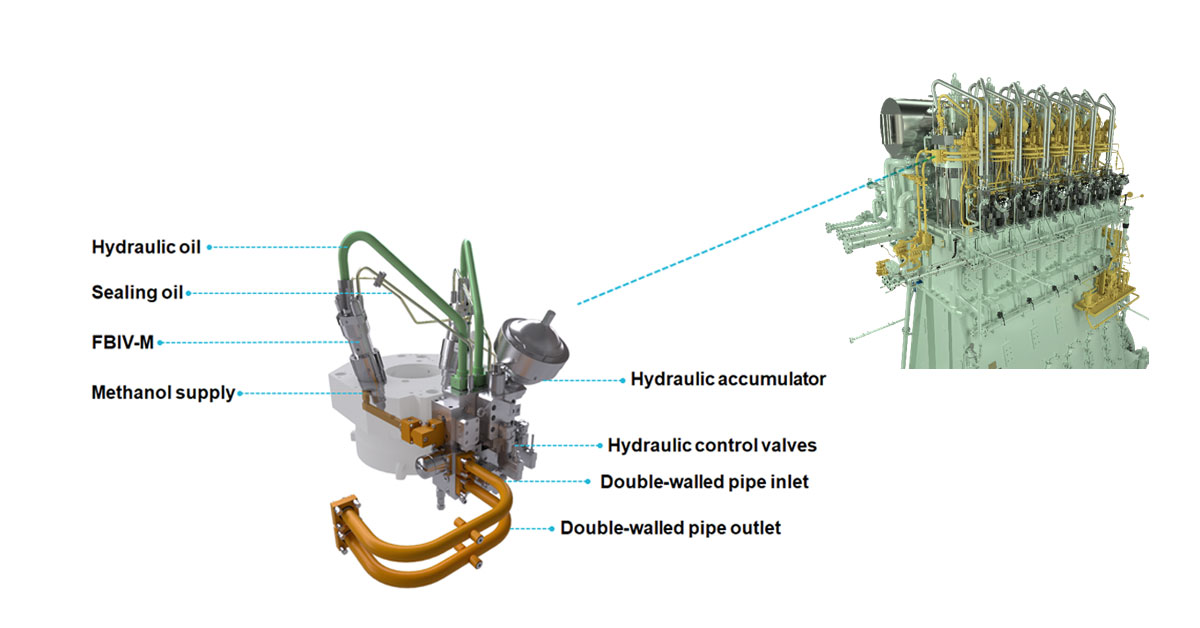Enabling a scalable energy transition
The MAN B&W ME-LGIM two-stroke dual-fuel engine can run on methanol as well as conventional fuels. Specifically designed to meet the needs of the maritime industry, it is a versatile and scalable solution that is suited to a wide range of vessel types. Simple handling, storage, and bunkering of methanol, combined with relatively simple auxiliary systems and the potential to be carbon-neutral, makes it an attractive option for meeting decarbonization targets.
Proven two-stroke methanol engine design
Available either for newbuilds or for upgrading existing conventional fuel vessels, this engine represents a proven, refined engine design based on over 600,000 running hours on methanol alone. Methanol produced from renewable sources is an attractive marine fuel option due to its low carbon intensity. An engine using green methanol can even provide carbon-neutral propulsion.
Key benefits
A new design for efficient methanol combustion
The ME-LGIM engine has inherited well-known components of our standard two-stroke diesel engine, like the ME-GI dual-fuel engine. Beneficial features of the standard MAN B&W two-stroke diesel engine have been retained. This illustration highlights methanol components and pipes that have been added to the cylinder top for methanol combustion.
The use of methanol as fuel type supports cost-effective vessel designs.

Moving together into a sustainable future
Learn more about the MAN B&W ME-LGIM engine
Continue reading
-
MAN B&W ME-LGIMpdf, 504 KB
Related products
Related News
MAN Cryo Lands World-First
MAN Cryo, part of MAN Energy Solutions and a leading expert in the field of storage and handling of LNG and natural gas, has announced the signing of a contract with Yantai CIMC Raffles Shipyard for the delivery of the fuel-gas supply systems (FGSSs) to a new series of two dual-fuel, 6,500 pure car carriers for Wallenius Marine on charter to Volkswagen.
Henrik Malm, Managing Director at MAN Energy Solutions, Sweden and Finland, said “This represents yet another world-first for MAN Cryo where the boil-off gas will be sent to the low methane-slip ME-GI via a high-pressure, boil-off-gas compressor. Due to the installed shaft generator, this further reduces the running hours on the auxiliary engines.”
The scope of delivery includes the following:
- port- and starboard-side bunkering stations
- LNG storage tank with a volume of 2,300 m3
- tank connection space with low-pressure vaporizer, BOG heater and two LNG pumps
- high-pressure gas-handling equipment for delivery of gas to MAN B&W ME-GI two-stroke main engine
- boil-off gas (BOG) management system, including one high-pressure compressor
- ·on-board nitrogen-generation system
- control system as well as gas-detection system.
The FGSSs for the vessels will be delivered during 2023.
About MAN Cryo
MAN Cryo offers systems for the storage, distribution and handling of liquefied gases and has a pioneering reputation within the marine sector and LNG business development. It supplied the world’s first LNG fuel-gas system for the ‘Glutra’ ferry in Norway in 1999, a vessel that is still operational to this day. More recently, in 2013, MAN Cryo supplied the world’s first bunker vessel, the ‘SeaGas’, with operations in Stockholm, Sweden.
Documents
-
PR MAN Cryo FGSS_EN
Contact
Nils Søholt
Trade Press Marine
Group Communications & MarktingMAN Energy SolutionsTeglholmsgade 412450 Copenhagen SVDenmark
nils.soeholt@man-es.com t +45 33 85 26 69Available languages
- DE ·
- EN
Get notified about press releases
Alternative fuels for your two-stroke powered vessel: Ammonia, methanol and methane in focus
Register for our next MAN ExpertTalk on alternative fuels for large merchant marine vessels. We will provide insights into the most promising marine fuels of the expected future fuel mix for two-stroke vessels, namely ammonia, methanol and methane.
Further, we will inform about the latest product developments and applications as well as reasons why these fuels have the potential to offer a straightforward path for the future maritime energy transition.
- Wednesday, April 24, 15:00 – 15:45 (W. Europe Standard Time)
- Thursday, April 25, 10:00 – 10:45 (W. Europe Standard Time)
